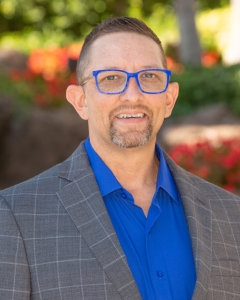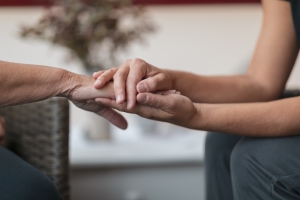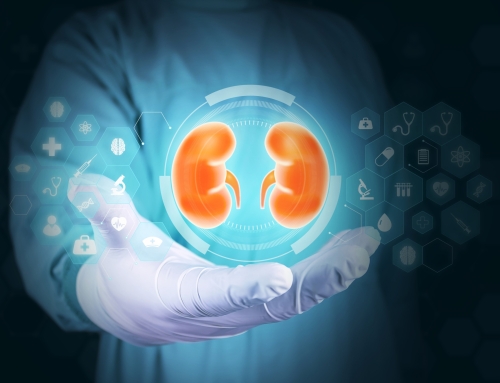
Gene Blankenship, DPC Board of Directors
Thinking about Life
Sitting in my recliner watching the leaves fall like big fat orange snowflakes, I see the trees begin to change colors. My immediate first thought is “How many more seasons of change will I see? Is this my last fall”?
Polycystic Kidney Disease (PKD) is a constant passenger in my life. Anytime you have a passenger with you for long periods of time, you will go through events together that stamp your life. For example, as a child, I watched Eugene Taylor Jr., my dad, hook himself up every day to his peritoneal dialysis port in his stomach. PKD also introduced me to death when my dad passed away just a few days after his transplant at St. Anthony’s Hospital in OKC. He was 33 and I was 12. Up to that point in my life, I had never dealt with death. I don’t know if we patients like to admit how much we think of our mortality. I understand that thought process all too well though .
Coping with My Diagnosis
In 2003, I was diagnosed with PKD and told that I needed to take steps to preserve my kidney functionality. My doctor put me on blood pressure medication, which I was thankful for because the constant “migraine” type headaches I would sometimes encounter nearly disappeared. Later down the road, more medications would be prescribed, but that is something that appears to happen to us all that suffer from End-Stage Kidney Disease (ESRD). What I found out through a simple process of elimination was what my body would allow me to eat and what I had to do in order to maintain my three-kilo fluid limit. The most difficult part for me was eliminating whole milk and Coca-Cola floats. Once I became settled with the idea that dialysis is a must until a transplant comes along, I hit the cruise control button and moved forward with my life. For a long period of time, I just allowed the illness of PKD to simply take up real estate in my mind. After talking with many others who suffer from ESRD, it appears that one of the monumental challenges for us all is overcoming those thoughts in our mind. It’s tough, and the only way I found to conquer those was through prayer and helping others. My faith in Jesus is something that has, without a doubt, carried me through all my challenging times. If I am focusing my energy on improving a situation for others, I do not have the time to dedicate to the false worries that we all want to avoid.
Support

I am beyond blessed with my support system. My wife Stacy is my number one cheerleader- she is really amazing. I will never forget the night we received my first transplant call. We dropped the kids off at my In-laws and drove the three hours to Little Rock, Arkansas. We arrived, got checked in, and were on the way to the room to get prepped for surgery when my phone rang. It was my Transplant Social Worker telling me something was wrong with the kidney, which meant I would not get the transplant that night. Talk about devastation, going from the highest of highs to not so excited. Stacy is my rock though, and because of her consistent positive attitude, we don’t dwell long. We mourn a few hours then it’s on to the next one. Being listed at three separate
facilities in two different regions, I feel like I have increased my chances as much as possible within reason.
Transplant Questions
After just three years of dialysis and the hope of a transplant living at the forefront of my mind, I began to ask questions. For example, the current CDC life expectancy is 77 years of age. The average number of people currently waiting for a kidney transplant is 100,000.
Should we look at organ donation education?
Should we re-evaluate our standards for donation?
Although a transplant is not a cure, many people treat it as one.
Should we look at what costs are covered for transplant medications and the lifelong screenings involved for transplant patients? I think transplant costs should be covered.
Some people will never be listed on the transplant list. Some will be listed and be in decent shape, but after long periods of time on dialysis, they will begin to develop issues. Before, their kidneys were cleaning and filtering waste and excess fluid from their blood 24 hours a day, 365 per year, but now dialysis machines are doing that just 16 hours per week. Let that sink in.
Advocacy
I know that I need to keep moving forward as a positive example for my kids. As a matter of fact, I would never tell my children to be quitters. I want them to run the good race and fight the good fight. I too, am doing this, as an advocate for both myself and other kidney patients. As you can tell from my transplant questions above, I was moving towards being a kidney patient advocate. At first, I began advocating alone, calling, writing, and emailing the different players in the community. Then after a few months, I became involved with a couple of different kidney/dialysis advocacy organizations. That to me was a new starting point. For example, I am now a Patient Ambassador and am on the Board of Directors for Dialysis Patient Citizens (DPC). I am thankful for organizations who fight for the benefit of the patients. Please join me in moving forward for all kidney patients; our lives may depend upon it!




